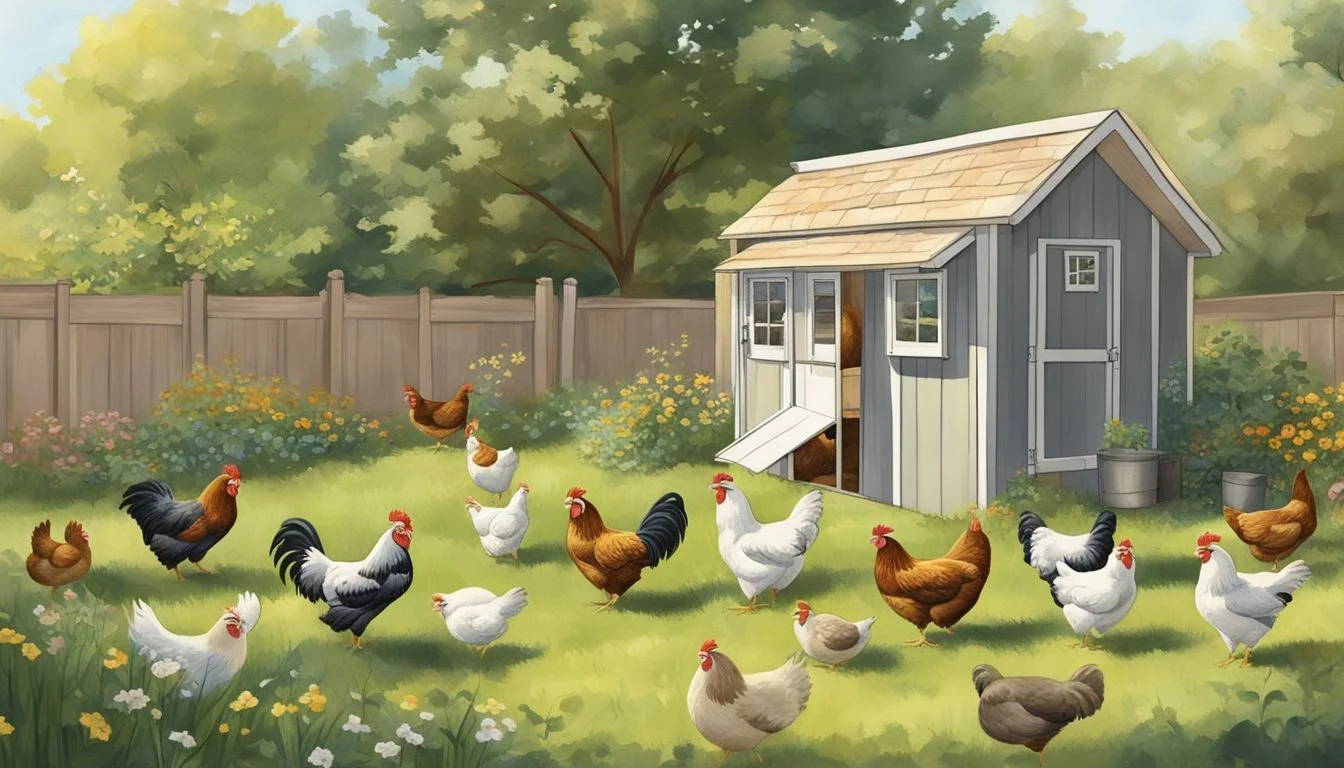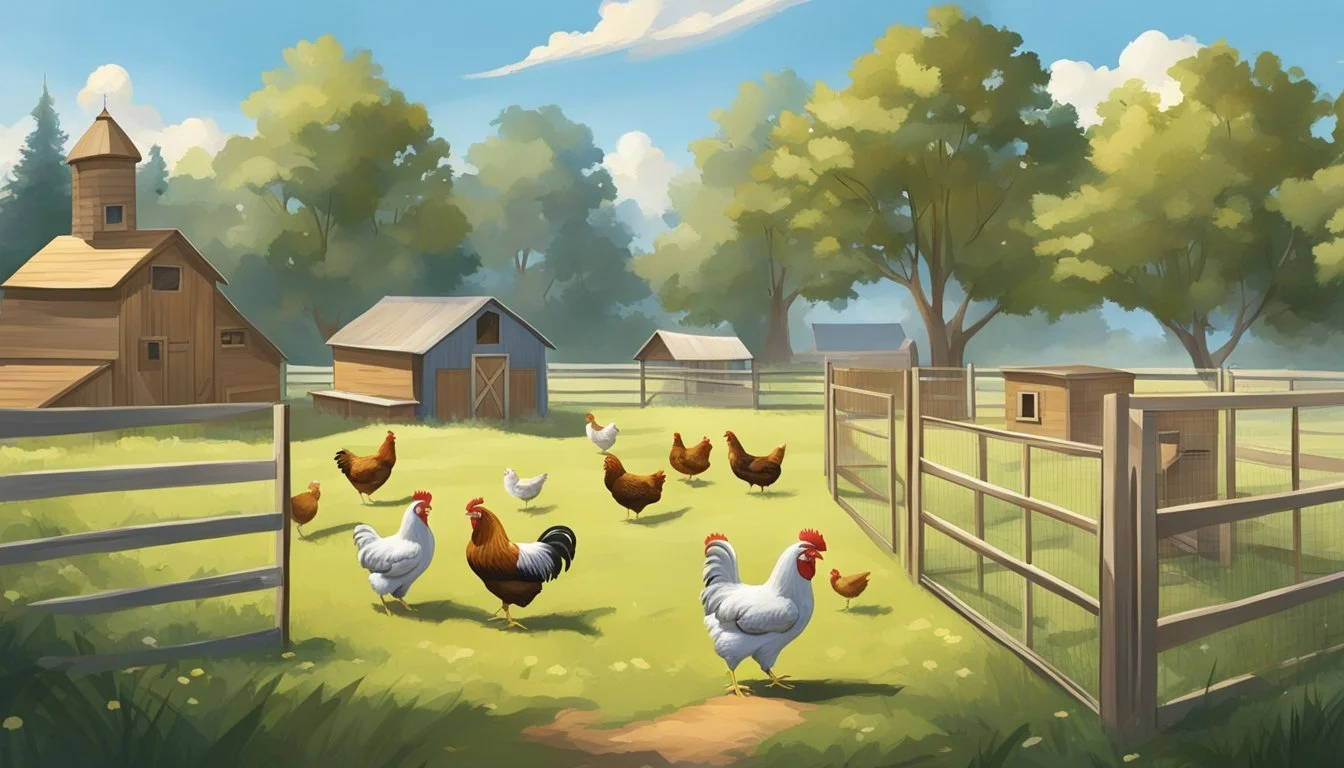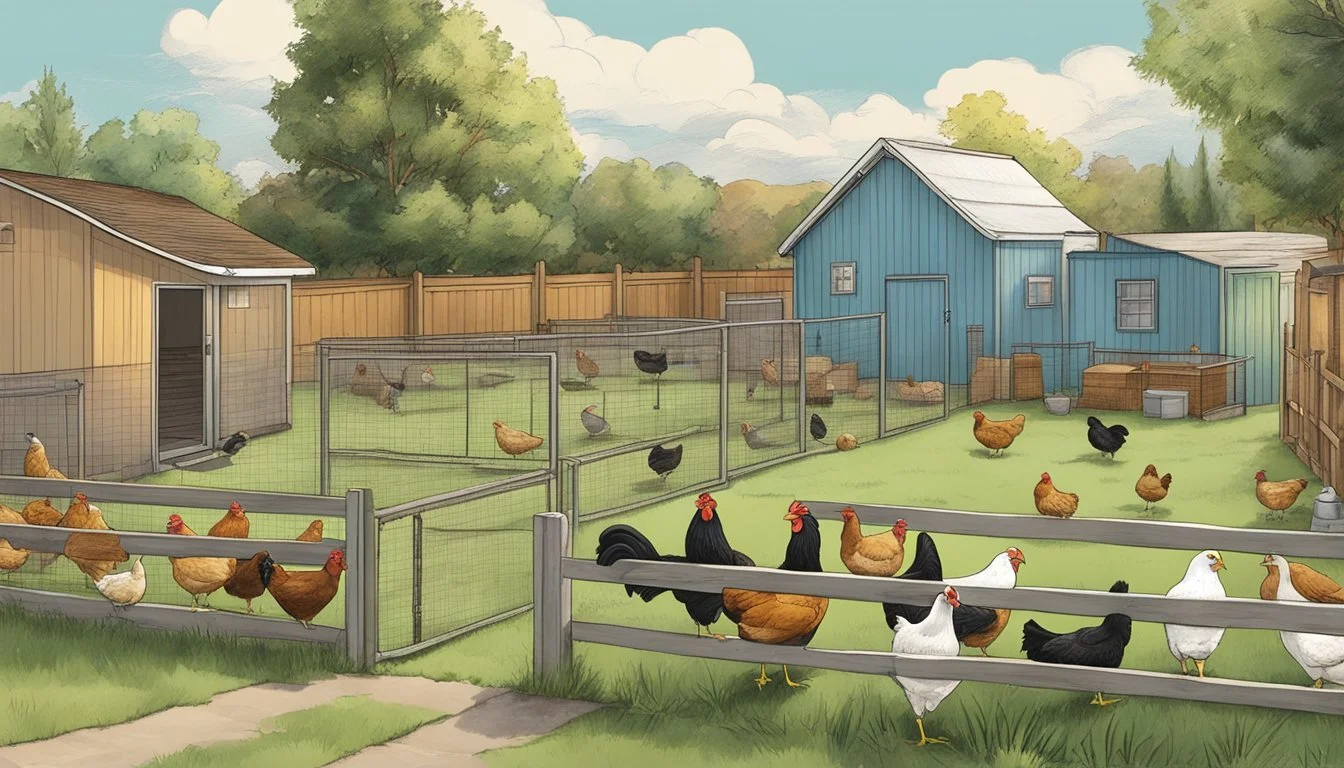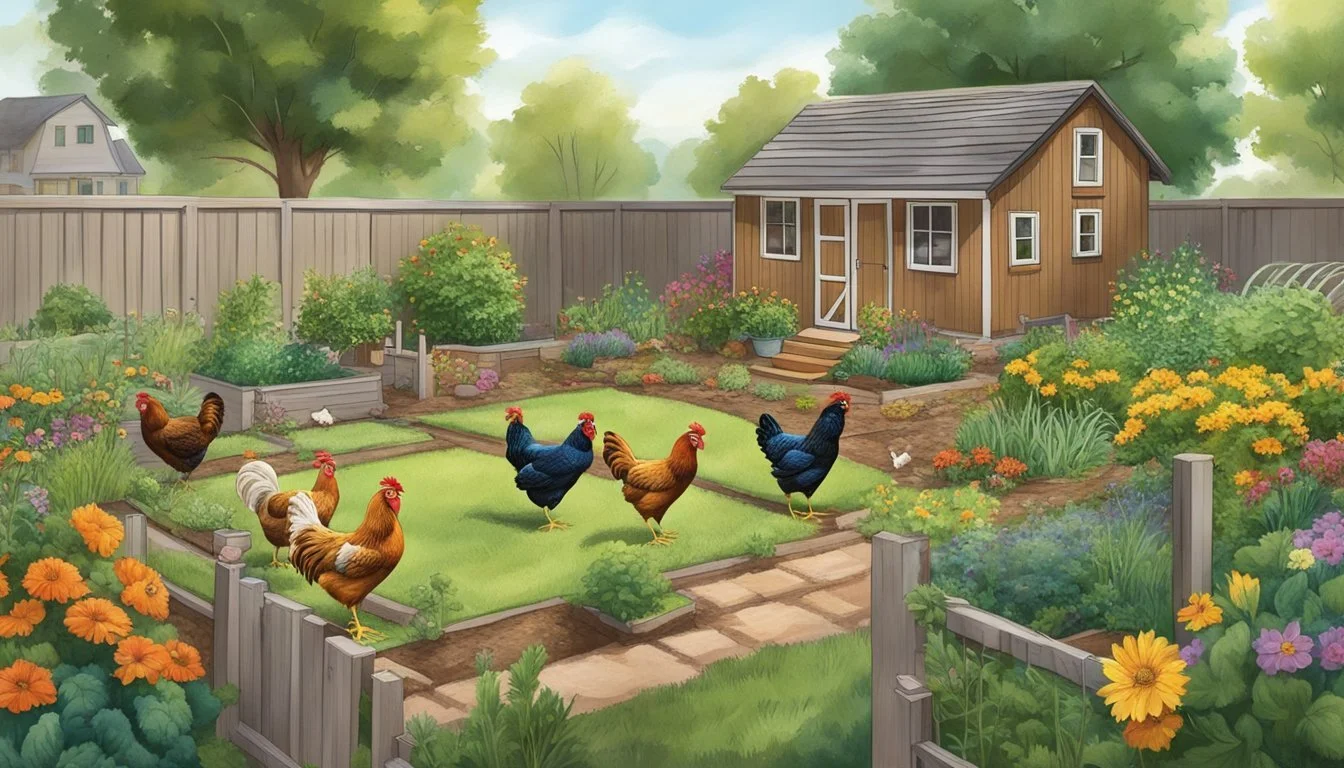Keeping Backyard Chickens in Greeley, CO
Essential Tips for Local Poultry Enthusiasts
Raising backyard chickens has become a popular hobby for residents in Greeley, Colorado. This trend is part of a larger movement towards sustainable living, where families take part in producing their own food. Greeley's local regulations reflect a community that acknowledges and accommodates urban farming practices. Keeping chickens, however, is not just a matter of placing a coop in the backyard; it requires adherence to specific city ordinances designed to ensure the well-being of the chickens, the consideration of neighbors, and the aesthetics of the community.
In Colorado, the climate can present particular challenges to raising chickens, with cold winters and hot summers requiring certain considerations for coop construction and chicken care. Ensuring that the birds remain healthy and comfortable throughout the year is essential, necessitating structures that provide sufficient insulation, ventilation, and protection from predators. Access to fresh water, appropriate feeding, and routine healthcare are equally critical in managing a backyard flock successfully.
Those interested in the pursuit need to be well-versed with Greeley's specific regulations, which outline the number of chickens allowed, coop specifications, and property line setbacks, among other stipulations. A guide to raising backyard chickens in Greeley would cover these rules thoroughly and provide practical advice on day-to-day care, from selecting appropriate chicken breeds to managing feeding and egg production. With the right information, Greeley residents can enjoy the rewards of raising backyard chickens responsibly and efficiently.
Local Ordinances and Laws
In navigating the intricacies of keeping backyard chickens in Greeley, CO, residents must adhere to specific local ordinances, familiarize themselves with the permitting process, and understand the legal ramifications of non-compliance. It's essential to grasp the nuances of Greeley's regulations compared to state laws and the situation in neighboring areas.
Understanding Greeley's Chicken Laws
Greeley's Municipal Code stipulates that homeowners must maintain a lot size of approximately 4,356 square feet of contiguous space for each chicken on nonagricultural properties. This requirement reflects the city's stance on maintaining certain space standards for animal husbandry within residential zones.
Permits and Permitting Process
To legally keep chickens within city limits, a resident must secure the appropriate permits from Greeley authorities. The process for obtaining these documents could involve an application to the city and an inspection to ensure compliance with local space requirements.
Legal Restrictions in Surrounding Areas
While Greeley has its unique set of requirements, surrounding areas in Weld County—such as Eaton, Evans, Garden City, and Lucerne—may have varying stipulations. For instance, lot size requirements and the number of chickens allowed could differ. Fort Collins, a neighboring city, may also have alternative restrictions.
Fines and Penalties for Non-Compliance
Non-adherence to Greeley's chicken laws can result in penalties. Fines could be imposed for violating space requirements or keeping chickens without a permit. Continued non-compliance might lead to increased fines or legal action.
Exception Clauses
Certain exception clauses may exist within Greeley's ordinances. For example, variances might be granted in specific cases where standard requirements cannot be met, provided that the situation does not cause a nuisance or health hazard.
Comparing State and Local Regulations
Greeley's local chicken laws may be more restrictive when compared with Colorado state regulations. It's essential to understand that state laws provide a framework, but individual municipalities like Greeley have the authority to impose stricter rules.
Setting Up a Chicken Coop
When establishing a chicken coop in Greeley, CO, it’s essential to focus on location, design, safety, sanitation, and appropriate accessorizing to ensure a functional and healthy environment for your flock.
Choosing the Right Location on Your Property
Selecting an optimal spot for your chicken coop involves assessing for flood risks, sun exposure, and proximity to your house. The location should offer some natural shade yet provide ample sunlight, and it should be close enough for convenience but far enough to manage noise and smell. Additionally, the spot should be on elevated ground to prevent waterlogging.
Designing Your Coop and Runs
A well-designed coop provides comfort and security. Ensure there’s adequate ventilation, nesting boxes, and roosting bars. Coop designs can vary, but having an east-facing door helps capture morning sunlight. Integrating runs should give chickens room to roam; covered outdoor runs protect them from aerial predators and harsh weather.
Ensuring a Predator-Proof Coop
In Greeley, protection against predators like raccoons, foxes, and birds of prey is crucial. Strengthen your coop by:
Using heavy-gauge mesh wire for enclosures
Securing ground perimeters with wire aprons
Installing locks on doors and nest boxes that cannot be easily manipulated by clever predators
Maintaining Cleanliness and Disease Prevention
Consistent cleaning is key to preventing diseases and maintaining the health of your chickens. A routine should include:
Regular removal of droppings and spent bedding
Disinfecting feeders and waterers
Monitoring for signs of pests or illness
Coop Accessories and Essentials
Accessorize the coop with:
Nesting boxes (one per 4-5 hens)
Roosting bars (8-10 inches per chicken)
Heat lamps cautiously installed for chicks and cold snaps
Proper feeders and waterers to keep supply clean and uncontaminated
Space Requirements and Maximum Capacity
Each chicken requires specific space to thrive:
Inside the coop: 3-4 square feet per chicken
In the run: 10 square feet per chicken
Adhere to local ordinances in Greeley regarding the maximum amount of chickens allowed to avoid overcrowding and to maintain a healthy flock.
Chicken Care and Management
Effective chicken care management in Greeley, CO, hinges on understanding and implementing proper feeding regimens, health monitoring practices, interaction techniques, and knowledge of the chicken lifecycle. Backyard chicken keepers must prioritize these aspects to ensure their poultry thrive.
Feeding and Nutrition
Chickens require a balanced diet of proteins, vitamins, and minerals to maintain health and egg production. From hatch to 8 weeks old, chicks should consume an 18-20% protein starter feed in crumble form. As they progress from 8 to 14 weeks, a 16-18% starter/grower feed sustains their development. Upon reaching 15-18 weeks, chickens can transition to a 16% finisher or a layer feed suitable for laying hens. Feed and supplies can be sourced from local feed stores in Greeley, ensuring a constant supply of appropriate nutrition.
Health Monitoring and Disease Control
Regular health checks are crucial to detect early signs of diseases, which range from respiratory infections to parasitic infestations. Keeping the coop clean and providing proper ventilation reduces disease risks. Vaccinations and treatments may be available from veterinary services, and it's imperative to stay alert to any health issues that could spread within a flock. Greeley's chicken owners are encouraged to create relationships with avian veterinarians for ongoing health support.
Handling and Interaction
Chickens, whether kept as pets or livestock, benefit from regular, gentle handling to reduce stress. This interaction also facilitates health inspections and creates a bond between the chickens and their keeper. Owners should always handle chickens with care, supporting their bodies and ensuring they feel secure to prevent injury.
Lifecycle: From Chicks to Laying Hens
The lifecycle management of chickens starts with setting up a brooder equipped with a heat lamp for baby chicks, providing warmth until their feathers develop. As hens mature, they begin laying eggs around the age of 5 to 6 months. Understanding each stage of development assists keepers in meeting the evolving needs of their chickens, from the vulnerable chick phase to robust laying hens capable of producing eggs regularly.
Legal Considerations Regarding Livestock
When keeping livestock such as chickens, ducks, or other poultry in Greeley, CO, it's essential to understand the specific legal restrictions and responsibilities. This ensures not only the well-being of the animals but also adherence to local ordinances.
Distinctions Between Chickens, Ducks, and Other Livestock
Chickens:
Allowed in residential areas, but local regulations vary.
Zoning ordinances must be consulted for property-specific rules.
Ducks and Other Livestock:
May have different regulations; checking with city ordinances is crucial.
Responsibility Towards Neighboring Properties
Owners must ensure their livestock does not cause issues for neighboring properties. This includes:
Nuisance Prevention: Proper fencing and enclosures to prevent animals from straying.
Health and Sanitation: Maintaining cleanliness to avoid odors and pests.
Regulations on Roosters and Noise Control
Roosters:
Often subject to stricter regulations due to potential noise.
Some areas may limit or prohibit roosters; check Greeley's specific ordinances.
Noise Control:
Livestock owners are responsible for minimizing disturbances.
Noise regulations are enforced to balance urban livestock benefits with community peace.
Community and Sustainability
The conversation around keeping backyard chickens in Greeley, CO, ties into larger themes of sustainability and community engagement. Residents contribute to environmentally-friendly food resources while interacting with local businesses and learning the importance of responsible animal care.
Contributing to Local Sustainable Food Practices
Keeping backyard chickens supports sustainable food practices by providing a local source of eggs, reducing the need for transportation and commercial farming resources. Residents of Greeley can partake in this self-reliant system which bolsters the local food chain and decreases the carbon footprint associated with egg production.
Engaging with Local Feed Stores and Communities
Interaction with local feed stores like J&T Feeds is a crucial aspect of the backyard chicken community. These stores not only supply essential items for raising chickens, such as feed and equipment but also serve as hubs for community advice, networking, and sharing of best practices.
J&T Feeds: Offers supplies and advice for backyard poultry owners.
These establishments help to strengthen the sense of community and shared interest in sustainable living.
Education and Responsibility in Raising Chickens
Education on the responsibilities involved in raising chickens is critical. It ensures the health of the chickens and safety of the community by preventing the spread of diseases like salmonella. Programs in Greeley like those offered by Blooming Health Farms can provide invaluable hands-on experience in both chicken care and sustainable agriculture principles.
Additional Resources and Further Reading
For those interested in raising backyard chickens in Greeley, Colorado, a wealth of resources is available. Individuals can expand their knowledge and ensure they are meeting all necessary regulations by consulting various guides, local community groups, and health advisories.
Community Groups: The backyard chicken owners' community in Colorado is a vibrant one, with groups like the Facebook group for Colorado backyard chicken owners counting over 10,000 members. These platforms can provide community support and share regional tips.
Guides: To dive deeper into the specifics of chicken care, one may consider guides provided by local programs or the cooperative extension. These materials often offer insights into feeding, coop maintenance, and daily care routines.
Health Resources: Maintaining the health of backyard chickens is critical. Prospective chicken owners should consult the Colorado State University Extension or local veterinarians for information on avian flu prevention and general poultry health management.
Here is a quick reference table for relevant resources:
Resource Type Description Availability Local Guides Detailed booklets on chicken care and local laws Public Library, Online Community Support Forums and groups for advice and experience sharing Online, Local Meetings Health Information Guidance on poultry health and disease prevention Veterinary Offices, Extension Services
By utilizing these resources, residents in Greeley looking to raise chickens can approach this endeavor with confidence and clarity.







